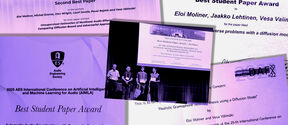LetterSampo Finland web service published data on 1.3 million letters and 120,000 correspondents from the period of the Grand Duchy of Finland 1809–1917
LetterSampo Finland is a new Linked Open Data service and semantic portal based on it, a new member in the Sampo system series of more than 20 related systems, which have had millions of users online. The linked contents of LetterSampo Finland, a semantic network, brings together for the first time comprehensively the data of 19th-century letter collections of key Finnish archives, libraries and museums, and is part of the national Digital Humanities research infrastructure FIN-CLARIAH/DARIAH-FI.
The dataset was aggregated from the databases of 17 Finnish cultural heritage organisations, including 1,700 letter collections, and contains information on 1.3 million letters, nearly 120,000 people, groups, and organizations related to them, and 2,200 places. These big data open up unique perspectives on 19th-century correspondence, letter collections, and through them, Finnish cultural heritage and its focus areas.
The LetterSampo Finland portal Kirjesampo.fi provides new information on letter collections and the actors connected to them, for example, the social networks of letter senders and recipients, gender and professional distributions, the extent of the materials and connections between them, and the representativeness of the data in relation to 19th-century correspondence culture. The portal offers a new kind of search interface to the metadata of the materials, and allows making data analyses and visualizations without programming skills. The system has also integrated the contents of previously published digital letter editions of Elias Lönnrot, J. V. Snellman, Zachris Topelius and Albert Edelfelt, including their texts.
The LetterSampo Finland project was carried out by a multidisciplinary consortium and a collaborative network of memory organizations, formed by the Finnish Literature Society, the University of Helsinki, Helsinki Centre for Digital Humanities (HELDIG and Helsinki Institute for Social Sciences and Humanities (HSSH), and Aalto University, Department of Computer Science, Semantic Computing Research Group (SeCo). Kirjesampo is based on Semantic Web and Artificial Intelligence technologies and has been forged in 2021-2025 using the Sampo model developed at Aalto University and the University of Helsinki with funding from the Research Council of Finland and the EU (NextGenerationEU).
More information
Project homepages:
- Aalto University and University of Helsinki (seco.cs.aalto.fi)
- SKS (coco.rahtiapp.fi)
Eero Hyvönen
Professor Aalto University, Department of Computer Science
Director, University of Helsinki, Helsinki Centre for Digital Humanities HELDIG
eero.hyvonen@aalto.fi
https://seco.cs.aalto.fi/u/eahyvone/
tel. +358 50 384 1618
This news item was originally published on the Aalto University website on 28.5.2025
Read more news
A survey on users' experiences of Mykanta in collaboration between Aalto University and Kela
Senior university lecturer Sari Kujala's research group is exploring, in collaboration with Kela, users' experiences with the Mykanta online patient portal and the MyKanta mobile application.
Specialised AI models could be Finland's next global export
Finland has the potential to build AI solutions that are different from ChatGPT-like large language models. Aalto University's School of Electrical Engineering already has decades of experience in developing specialised, resource-efficient AI models. They could be a key component of future 6G networks, automation, and industrial systems – and the next competitive edge of our country.
Professor Patric Östergård becomes a member of the Finnish Society of Sciences and Letters
Finnish Society of Sciences and Letters is Finland's oldest science academy. It promotes scientific discussion, publishes scientific literature, awards prizes and provides financial support for research.